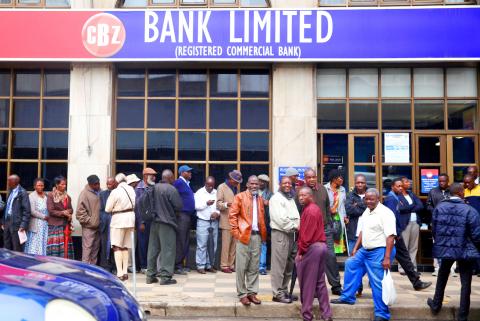About a third of the customers queuing at La Maison du Bitcoin’s teller windows in Paris are not speculating on the value of the cryptocurrency. They are sending digital money home to Africa.
“In many countries in Africa, there are far more cellphones than bank accounts,” La Maison cofounder Manuel Valente said. “For bitcoin, all you need is a phone.”
Zimbabwe, where the price of bitcoin spiked to double the international rate after this week’s military takeover, shows JPMorgan Chase & Co chief executive officer Jamie Dimon, UBS Group AG chairman Axel Weber and other cryptocurrency skeptics where the real-world use of bitcoin, and possibly its future, lies.

Photo: Reuters
It is becoming the preferred way for residents of failing economies to transfer money without dealing with banks, protecting their savings from political turmoil and avoiding the local currency when its value declines due to inflation.
There is no data on how much digital money leaves industrialized nations for the developing world. Part of the allure of electronic cash is the ability to transfer it anonymously.
However, as events in Zimbabwe have confirmed, bitcoin, the world’s most popular cryptocurrency, is most attractive when confidence in institutions falls.

Photo: AFP
“Bitcoin is a safe haven for people around the world who don’t trust their governments,” said Andrew Milne, chief investment officer and cofounder of Altana Digital Currency Fund, a US$22 million hedge fund that invests in cryptocurrency assets. “There are many countries where people are looking for an asset that isn’t vulnerable to banks blowing themselves up.’’
Zimbabwe gave up its own currency in 2009, the same year bitcoin was born, after hyperinflation led to the printing of a 100 trillion Zimbabwean dollar note. The country uses the US dollar, the South African rand and digital money.
People buy and sell bitcoins on a secure peer-to-peer network that does not rely on any government or central bank.
Trying to control it is “like trying to catch water,” said Alex Tapscott, chief executive officer of NextBlock Global Ltd, a venture capital firm that invests in start-ups involved in blockchain, the shared digital ledger that records transactions made with cryptocurrency.
Leaders of three of the world’s biggest banks have expressed skepticism about the stability and endurance of bitcoin.
In September, Dimon threatened to fire any JPMorgan trader foolish enough to bet on it.
Weber last month said that bitcoin has no intrinsic value, because nothing backs it.
Earlier this month, Credit Suisse Group AG chief executive officer Tidjane Thiam said that “the only reason today to buy or sell bitcoin is to make money, which is the very definition of speculation and the very definition of a bubble.”
Residents of Zimbabwe and Venezuela, where the annual accumulated inflation rate is 825 percent, might disagree.
In Africa, converting bitcoin to the local currency is often handled by local entrepreneurs, either with licensed change points similar to Paris’ La Maison du Bitcoin, or, on a smaller scale, an individual with a mobile phone and a pocket of cash, Valente said.
“It’s like a walking exchange point,” Valente said. “It’s very decentralized.”
Buying goods and services with cryptocurrency is still difficult to do, but Valente said he has heard of shops that accept bitcoin opening in many African countries.
Entrepreneurs have started companies intended to serve bigger markets.
BitPesa Ltd, a Kenya-based start-up, provides international money transfers and other services in bitcoin in Nigeria, Tanzania, Uganda and its own country. Unocoin does the same in India, as does Coins.PH in the Philippines.
Back in Paris, a few blocks from La Maison du Bitcoin is Passage du Grand Cerf, a covered street of shops.
They all display a sticker on their windows declaring “We Accept Bitcoin.” The stores sell everything from antiques to designer clothing.
Most proprietors said they have averaged a few transactions a month in bitcoin, frequently to Africans.
“We’ve made about 20 or more sales in bitcoin in the past year,” said Yann Robert, who runs a designer clothing store. “The buyers are usually from Africa, a few from Asia — China, Japan. And they’re very happy, because not that many stores accept bitcoin.”

SEMICONDUCTORS: The German laser and plasma generator company will expand its local services as its specialized offerings support Taiwan’s semiconductor industries Trumpf SE + Co KG, a global leader in supplying laser technology and plasma generators used in chip production, is expanding its investments in Taiwan in an effort to deeply integrate into the global semiconductor supply chain in the pursuit of growth. The company, headquartered in Ditzingen, Germany, has invested significantly in a newly inaugurated regional technical center for plasma generators in Taoyuan, its latest expansion in Taiwan after being engaged in various industries for more than 25 years. The center, the first of its kind Trumpf built outside Germany, aims to serve customers from Taiwan, Japan, Southeast Asia and South Korea,

POWERING UP: PSUs for AI servers made up about 50% of Delta’s total server PSU revenue during the first three quarters of last year, the company said Power supply and electronic components maker Delta Electronics Inc (台達電) reported record-high revenue of NT$161.61 billion (US$5.11 billion) for last quarter and said it remains positive about this quarter. Last quarter’s figure was up 7.6 percent from the previous quarter and 41.51 percent higher than a year earlier, and largely in line with Yuanta Securities Investment Consulting Co’s (元大投顧) forecast of NT$160 billion. Delta’s annual revenue last year rose 31.76 percent year-on-year to NT$554.89 billion, also a record high for the company. Its strong performance reflected continued demand for high-performance power solutions and advanced liquid-cooling products used in artificial intelligence (AI) data centers,

Gasoline and diesel prices at domestic fuel stations are to fall NT$0.2 per liter this week, down for a second consecutive week, CPC Corp, Taiwan (台灣中油) and Formosa Petrochemical Corp (台塑石化) announced yesterday. Effective today, gasoline prices at CPC and Formosa stations are to drop to NT$26.4, NT$27.9 and NT$29.9 per liter for 92, 95 and 98-octane unleaded gasoline respectively, the companies said in separate statements. The price of premium diesel is to fall to NT$24.8 per liter at CPC stations and NT$24.6 at Formosa pumps, they said. The price adjustments came even as international crude oil prices rose last week, as traders

SIZE MATTERS: TSMC started phasing out 8-inch wafer production last year, while Samsung is more aggressively retiring 8-inch capacity, TrendForce said Chipmakers are expected to raise prices of 8-inch wafers by up to 20 percent this year on concern over supply constraints as major contract chipmakers Taiwan Semiconductor Manufacturing Co (TSMC, 台積電) and Samsung Electronics Co gradually retire less advanced wafer capacity, TrendForce Corp (集邦科技) said yesterday. It is the first significant across-the-board price hike since a global semiconductor correction in 2023, the Taipei-based market researcher said in a report. Global 8-inch wafer capacity slid 0.3 percent year-on-year last year, although 8-inch wafer prices still hovered at relatively stable levels throughout the year, TrendForce said. The downward trend is expected to continue this year,